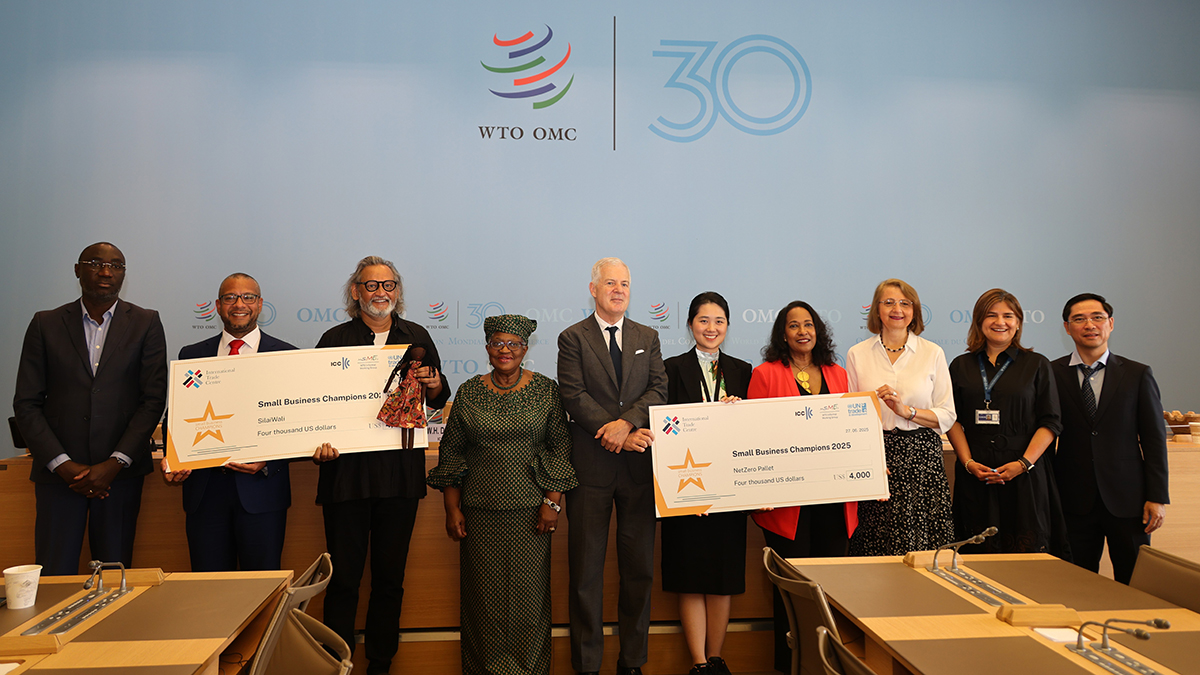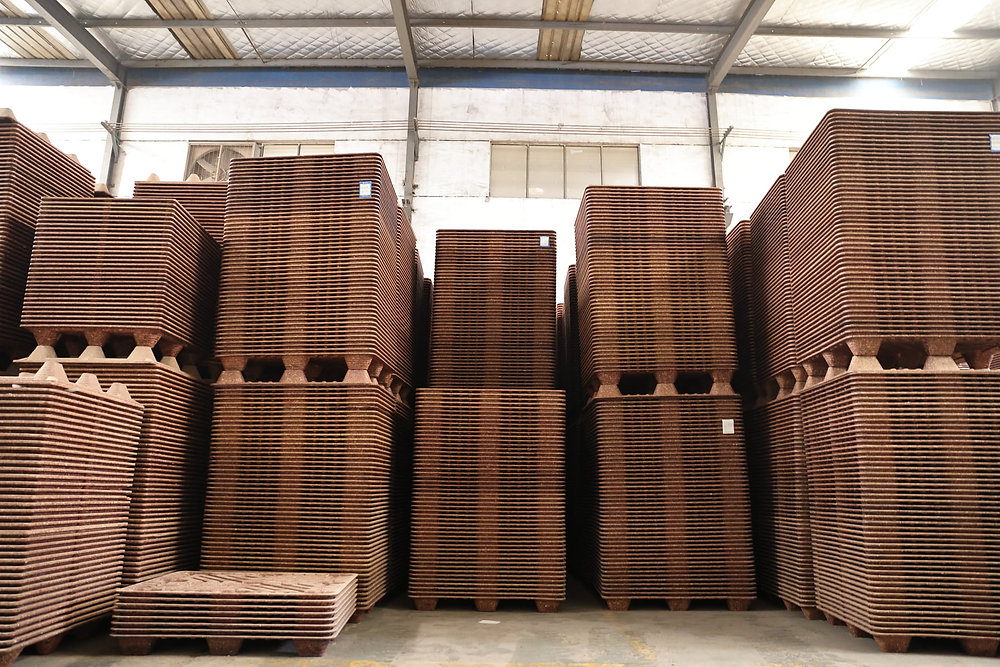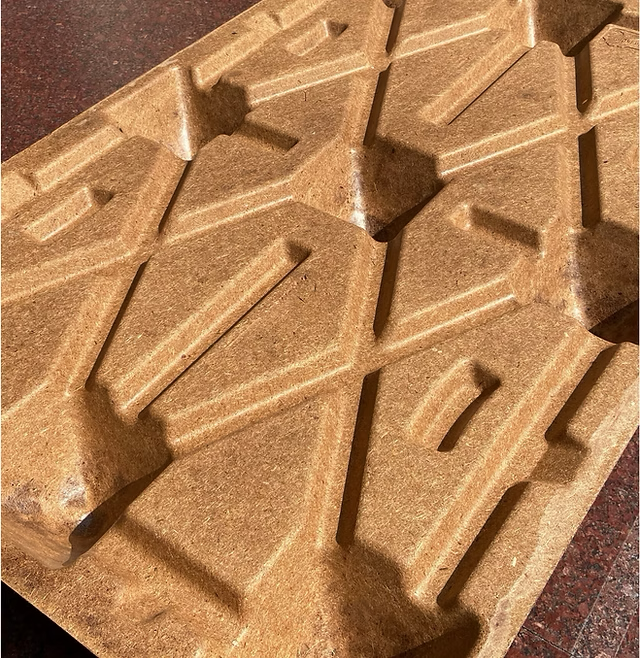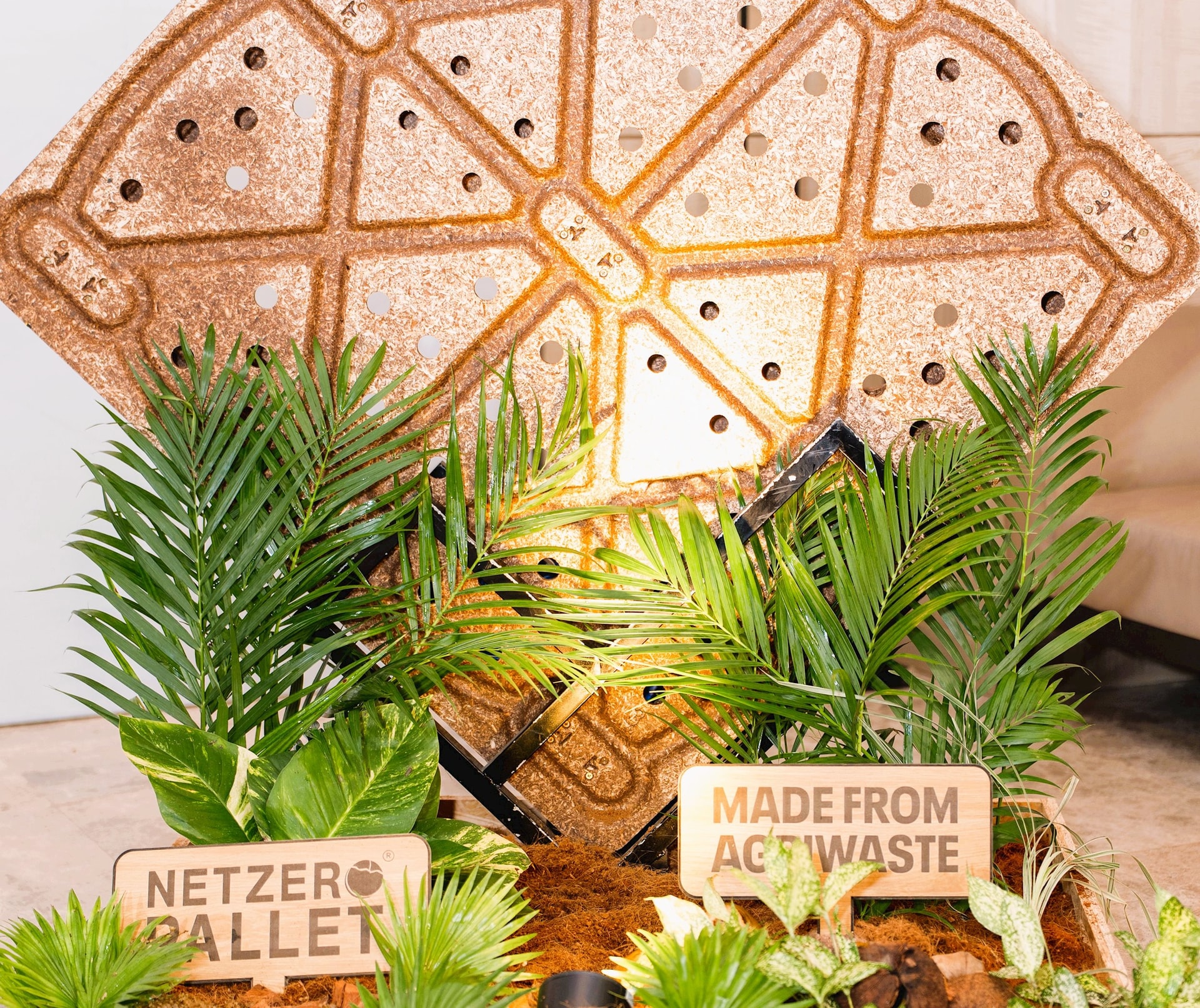On 25/6, Veritas, a Vietnamese startup specializing in producing pallets from agricultural byproducts, became one of two businesses to win first place in the 2025 Global Small Business Awards with its NetZero Pallet (a bio-based pallet made from coconut husks). The program was organized by the World Trade Organization (WTO). Surpassing over 2,000 applications from numerous countries, the project was highly regarded for its innovation in production and sustainable business model.
Speaking about this success, the founder of Veritas said that the NetZero Pallet is one of the products that "revived" the company.
 |
Veritas representative (5th from right) receiving the award at the 2025 Global Small Business Awards organized by the WTO. Photo: Veritas |
Veritas representative (5th from right) receiving the award at the 2025 Global Small Business Awards organized by the WTO. Photo: Veritas
Veritas's journey began with founder Le Thanh's passion for sustainable fashion. In 2015, he developed the ShoeX brand with products like shoes, glasses, and cups made from coffee grounds.
Between 2019 and 2020, when the Covid-19 pandemic disrupted supply chains, the business had to temporarily switch to producing masks to maintain operations. At this time, the business was in a state of limbo. The story changed when he met his colleague, engineer Tran Thao, who formulated the current pallet formula, co-founder and Chief Strategy Officer (CSO).
Also during the Covid-19 period, Thao returned to her maternal grandmother's home in Ben Tre (now Vinh Long) and witnessed people burning coconut fiber in their gardens, creating thick smoke. From the perspective of a materials specialist, she saw the potential in discarded materials like coconut fiber, coffee husks, and rice husks – byproducts rich in mechanical and physical properties that could create durable, moisture-resistant, and environmentally friendly biomaterials.
At that time, Vietnam had over 150 million tons of agricultural byproducts annually, 50% of which were burned or released into the environment, causing 12 million tons of CO2 emissions and generating almost no added value for farmers.
847 failures to find the right formula
In 2022, Thao collaborated with colleagues at Veritas to begin researching biomaterials. Initial material trials were brittle, prone to mold, not durable enough, or had high production costs.
After 7 months and 847 adjustments, reducing pressing temperature and adding 2% natural rubber, the team produced a prototype that met all criteria: durable, lightweight, flexible, moisture-resistant, and mold-resistant. A proprietary biomaterial formula gradually emerged, consisting of 60% coconut fiber, 25% coffee husks, 10% rice husks, and the remainder being natural rubber and bio-additives.
From this technological foundation, the NetZero Pallet brand was born, aiming to replace traditional wooden pallets with low-carbon biomaterials. The company began developing a collection network in the western and southeastern provinces, attracting over 15,000 farming households, each earning an additional 2-3 million VND per month from what was once discarded.
The first large order came from a beverage corporation, which tested 15,000 NetZero Pallets in their warehouse. Meeting ISO 9001, ISPM 15, and FSC standards and withstanding continuous operation for 12 months, the pallet solution passed the trial phase. By September of the same year, the official contract was signed.
 |
The first shipment after the trial phase. Photo: Veritas |
The first shipment after the trial phase. Photo: Veritas
The product was positively received by the market, tripling revenue in 2023 compared to 2022, with 100,000 pallets sold, primarily through a B2B model. In 2024, orders increased sixfold, reaching 600,000 products.
"We don't just produce pallets, we want to redefine industrial products from biomaterials," Le Thanh said.
According to a Veritas representative, the current NetZero Pallet has a high load capacity (dynamic load 1,000-2,000 kg, static load 5,000-10,000 kg), contributing to increased operational efficiency. The product is also water and termite-resistant, reducing replacement frequency and saving long-term costs.
The smart stacking design reduces storage space by up to 70%, thereby cutting transportation costs. Furthermore, the product is not bound by the ISPM 15 quarantine regulations applied to wooden pallets, thus reducing export costs.
Veritas's bio-pallets can be flexibly applied in various industries: from e-commerce and warehousing—where packaging speed and goods preservation are essential—to agricultural and food exports with FDA certification, ensuring supply chain safety. In the electronics industry, the product is free of heavy metals and meets RoHS standards, suitable for the stringent requirements of component factories.
However, the next challenge is how to increase competitiveness with plastic and wooden pallet units and low-cost manufacturers.
 |
Finished pallets made from coconut fiber. Photo: Veritas |
Finished pallets made from coconut fiber. Photo: Veritas
AI optimizes costs and increases competitiveness
The pallet production process involves multiple stages. Coconut husks are ground and dried into a fine powder before entering the polymerization phase. The mixture is then blended with a bio-binder to create a composite material. A molding machine system produces finished products with a capacity of 500-1,000 pallets per day. The next step is finishing to ensure correct dimensions and standards. Finally, the products undergo QA/QC system testing for indicators such as mechanical strength, moisture content, and load capacity.
To optimize costs, the company uses AI to simulate designs from the blueprint stage, optimizing durability and cost, while allowing customization to meet each customer's needs. AI application helps score and classify materials from the procurement stage, ensuring 95% of input materials meet standards, saving half the cost and increasing productivity.
 |
The product is showcased at various exhibitions and green solution investment programs. Photo: Veritas |
The product is showcased at various exhibitions and green solution investment programs. Photo: Veritas
According to the CEO of Veritas, every 6 pallets is equivalent to protecting one tree. With a production capacity of over 1.6 million pallets per year, the company can indirectly contribute to protecting around 270,000 trees annually. This is one indicator of the positive environmental impact of replacing traditional wooden pallets with bio-based solutions from agricultural byproducts.
Aiming to become the largest bio-pallet producer in the region, the company has set a target of replacing 10.3 million traditional pallets by 2029.
The global pallet market reached 79 billion USD (2023), with sustainable pallets experiencing rapid growth. According to a report from Gitnux, the logistics industry accounts for 8-10% of total global greenhouse gas emissions, with road transport alone accounting for about 70% of total emissions in the logistics sector.
As the world pushes for carbon neutrality, many businesses are proactively reducing emissions from their production and logistics processes. Solutions like NetZero Pallet are expected to become a green link in the sustainable supply chain.
Replacing wooden pallets with biomaterials, like Veritas's solution, is expected to be a crucial link in the green transition, opening up sustainable development for businesses while bringing positive value to the environment and community.
Thai Anh












